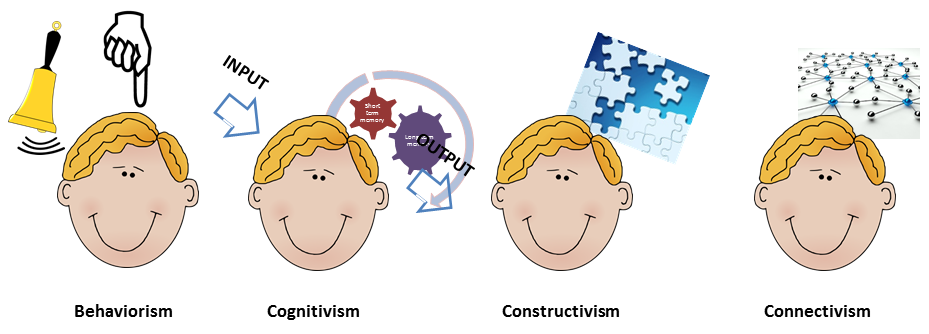Week 1: Overview
How People Learn
Educators have been trying to understand the way people learn for a long time. Although we rely on our own observations and experiences in teaching, we can benefit from considering some of the current research and recommendations published by respected publishers, institutions or researchers/instructors.
Behaviourism includes theories that are based on changes in behaviour that can be directly observed and measured. Cognitivism includes theories that focus on the way the human brain take in information and stores it for recall and application. Constructivism includes
a range of theories that begin from a subjective perception of reality
and may include a belief that learning occurs through social
interactions. A final theory (still argued by many) is Connectivism.
This theory was developed to address the way learning has changed due
to the exponential increase in information due to advances in digital
technologies and connectivity. A central belief is that learning occurs
primarily (most effectively?) through networked learning.

| Behaviourism | Cognitivism | Constructivism | Connectivism | |
|---|---|---|---|---|
| How does learning occur? | stimulus -> response; observable behaviour main focus, chaining events | input -> process -> output (learning) structured, computational | meaning created by each learner (personal);focus on social learning | Distributed within a network, social, technologically enhanced, recognizing and interpreting patterns |
| What factors influence learning? | nature of stimulus (reward; punish), timing of events | existing schema, previous experiences | Engagement, participation, social, cultural | Diversity of network |
| What is the role of the memory | Repeated experiences are remembered - timing & type of reward / punishment are most influential | Encoding to long term memory, retrieval | Prior knowledge remixed to current context | Adaptive patterns, representative of current state, existing in networks |
| How does transfer occur? | Stimulus, response | Duplicating knowledge constructs of "knower" | Socialization | Connecting to (adding nodes) |
|
What types of learning are best explained by this theory? | Task-based learning | Reasoning, clear objectives, problem solving | Social, vague ("ill defined") problem solving | Complex learning, rapid changing core, diverse knowledge sources |
|
Names of some theorists | I. Pavlov, B.F. Skinner, J. Watson | D. Ausubel, J. Bruner, R. Gagne | J. Dewey, L. Vygotsky, E. von Glaserfeld | S. Downes & G. Siemens |